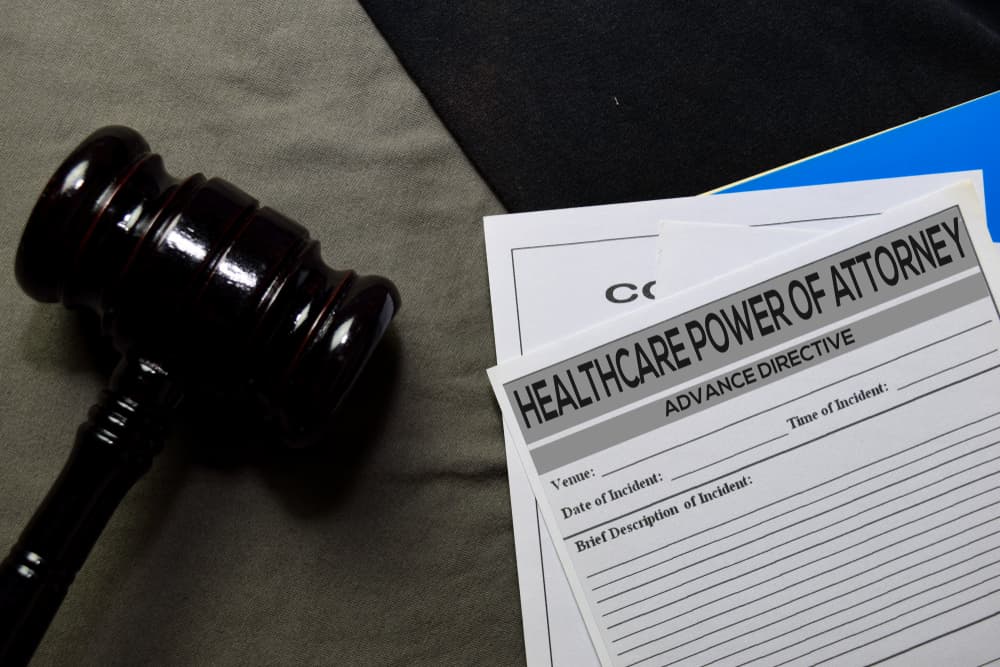How to Appoint a Healthcare Power of Attorney?
How to Appoint a Healthcare Power of Attorney?

Appointing a healthcare power of attorney (HCPA) may require the assistance of skilled legal professionals who can draft documents tailored to your unique circumstances and medical wishes.
While the process is generally straightforward, it demands attention to detail to avoid potential missteps or confusion later.
Insights from experienced power of attorney lawyers can clarify the best ways to establish this essential document, address challenges that may arise, and provide peace of mind by securing your preferences for future medical decisions.
What is a healthcare power of attorney?
A healthcare or medical power of attorney is a legal document that authorizes a trusted person to make medical decisions when you cannot do so yourself. This tool is vital to end-of-life planning and advance directives, providing clarity during emergencies or prolonged illnesses.
Key components of a medical power of attorney
When drafting this document, there are specific elements to consider to ensure its effectiveness:
- Principal: The individual granting the authority (you).
- Agent: The person designated to make medical decisions on your behalf.
- Scope of authority: Outlines what decisions the agent can make, from treatment plans to end-of-life care.
- Activation: Specifies when the healthcare power of attorney becomes valid, often tied to incapacitation.
Understanding these components clearly can help avoid misunderstandings or conflicts down the line.
Who should you appoint as your healthcare agent?
This individual should act in your best interest, respect your wishes, and be capable of making emotional decisions in high-pressure situations. Qualities to look for in a healthcare agent include but are not limited to:
- Trustworthiness: Someone you have complete confidence in to act according to your preferences.
- Decision-making ability: A person who can handle the weight of medical decisions calmly and effectively.
- Communication skills: An agent who can clearly relay your wishes to healthcare providers and other family members.
- Availability: Consider whether the individual will be accessible in case of emergencies.
Family members or close friends are common choices. Alternative agents can also be named to fill the role if your primary choice is unavailable.
What are the legal requirements for being a healthcare power of attorney?
The qualifications for someone to act as an HCPA are generally straightforward but carry important legal and ethical responsibilities. While specific laws may vary, most legal frameworks require that the designated agent meets the following basic criteria:
- Age and capacity: The person must be at least 18 years old and of sound mind, meaning they fully understand the responsibilities they’re taking on.
- Not a healthcare provider: Certain regulations may prohibit your agent from being your doctor or another healthcare provider directly involved in your care.
Once appointed, the individual assumes significant legal responsibilities, including adhering to relevant laws and following the principal’s expressed wishes. These responsibilities often include:
- Complying with advance directives: If the principal has left specific instructions, the agent must make decisions consistent with their preferences.
- Acting within the scope of authority: The agent must adhere to the boundaries outlined in the medical power of attorney document regarding treatment decisions, facility placement, or end-of-life care.
- Maintaining transparency: The agent may need to communicate with involved family members and healthcare providers while safeguarding the principal’s privacy and medical records.
Understanding these obligations is crucial for the person chosen to act as a healthcare power of attorney. Consulting legal professionals during the appointment process can help the principal and the agent navigate their responsibilities with clarity.
Steps to appoint a healthcare power of attorney
Appointing an HCPA involves careful planning and attention to key legal and logistical elements. Each step is essential in creating a reliable document representing your medical preferences and safeguarding your interests.
Step 1: Understand the scope of the document.
A healthcare or medical power of attorney is more than a list of preferences. It defines the extent of decision-making authority granted to your healthcare agent.
Key provisions to include may address the following areas:
- Specific treatments to accept or refuse: Details about life-prolonging procedures, pain management, or specific interventions.
- Preferences for medical providers or facilities: Guidance on trusted doctors or desired treatment locations.
- Life-sustaining measures: Directions regarding the use of feeding tubes, ventilators, or other life-support systems.
Clearly defining the scope of authority helps reduce ambiguity and minimize potential disputes. Collaborating with a legal professional during this stage can help craft provisions that reflect your wishes comprehensively while meeting legal standards.
Step 2: Choose your healthcare agent.
Choosing a healthcare agent is a significant decision, and confirming that the person you appoint is ready and able to take on the role is important. Open communication is key to making sure they understand the responsibilities involved and feel prepared to act in alignment with your preferences.
To help assess their readiness, consider asking questions like these:
- Are you comfortable making end-of-life decisions if necessary? This helps gauge their willingness to handle serious and emotionally charged scenarios.
- Do you feel confident advocating for my medical wishes? A strong advocate is essential when dealing with healthcare professionals and family members.
- Will you respect my instructions, even if they differ from your personal beliefs? This ensures they can prioritize your preferences over their own views.
- Are you available to be contacted in case of an emergency? Accessibility is crucial for timely decision-making in urgent situations.
- Do you understand the scope of responsibilities involved? Ensure they know the decisions they may need to address, such as treatment or facility choices.
These conversations create an opportunity to ensure that the person you appoint fully understands the role and can handle its demands. It’s also a chance to clarify any expectations and confirm they are ready to act in your best interest when the time comes.
Step 3: Draft your healthcare power of attorney.
Creating an enforceable HCPA involves following specific legal requirements, depending on your location. This phase involves drafting a document that effectively communicates your intentions. Key elements to include are:
- Accurate personal and agent information: Full names and contact details.
- Detailed decision-making authority: Clear guidance on the agent’s role and limitations.
- Conditions for activation: Situations in which the document takes effect, such as incapacity or medical emergencies.
State-approved templates or custom drafts created with an attorney’s help can help craft the document to meet all necessary legal criteria while aligning with your unique needs.
Step 4: Finalize with signatures and notarization.
A medical power of attorney typically requires formal validation, including signatures and, in many cases, notarization or witnesses. Preparation should involve:
- Signing requirements: The principal (you) and the agent must sign.
- Notarization or witness acknowledgment: Depending on state regulations, this could involve a licensed notary or one or more witnesses.
Completing these formalities strengthens the document’s legal standing, reducing the likelihood of disputes or challenges during its use.
Step 5: Distribute and store the document.
After finalizing the document, it’s critical to ensure it is easily accessible to the relevant parties. Key steps for distribution and storage include:
- Providing copies to key individuals: Share the document with your agent, family members, and healthcare providers.
- Secure and accessible storage: Consider keeping it in a home safe, safety deposit box, or a secure electronic repository.
Proper distribution and storage eliminate potential delays in locating or validating the document when timely decisions are required, ultimately supporting its purpose during critical moments.
How a lawyer can help in the HCPA appointment process
Appointing an HCPA involves important decisions and steps, many of which can feel complex. Legal professionals play a vital role in simplifying the process, tailoring your documents to meet your needs, and addressing potential challenges as they arise.
Here are key ways a power of attorney lawyer can assist during this critical process:
- Clarifying legal requirements and terminology: Lawyers help translate complex legal language into practical steps, ensuring your document is clear and enforceable. They can help you meet all state-specific healthcare power of attorney criteria.
- Assisting with family dynamics: Disputes or disagreements among family members can complicate the process. Lawyers can offer strategies to prevent conflicts, such as naming alternate agents or carefully defining roles within the document.
- Providing comprehensive planning: Beyond basic document creation, legal professionals help account for long-term considerations, including advanced medical directives, life-sustaining treatment preferences, and end-of-life care.
- Addressing unique challenges: For cases involving high-stakes medical decisions, lawyers can draft specific provisions that reflect your values and respect your choices.
A lawyers assistance in these areas can help mitigate potential challenges in the appointment process, including but not limited to:
- Managing disputes among potential agents: Lawyers often recommend naming a primary agent and alternates to provide flexibility while reducing conflict. Clear, well-defined language in the document reduces the risk of disagreements.
- Keeping your document updated: Life changes, such as marriage, divorce, or medical advancements, may require updates to your healthcare power of attorney. Working with a lawyer makes revisions seamless and ensures all changes comply with current laws.
- Navigating compliance concerns: Healthcare powers of attorney often intersect with other legal areas like living wills or HIPAA regulations. A legal professional can integrate these elements smoothly, ensuring your rights or preferences are not overlooked.
Collaborating with a lawyer brings clarity and structure to the process and adds an element of protection that helps secure your medical and legal choices. Their guidance can pave the way for smoother decision-making during initial setup and in handling future developments.
Healthcare Power of Attorney FAQs
Wondering how to appoint a healthcare power of attorney? Contact The Estate Plan for experienced legal support.
Appointing a healthcare power of attorney is an impactful decision that aligns medical care with your values and wishes. Taking proactive steps to create a clear, legally binding document reduces uncertainty and stress for your loved ones during critical situations.
Are you ready to explore your options for appointing a healthcare power of attorney or updating your current documents? Contact Miami estate planning lawyer online or at (305) 735-2689 for compassionate, personalized legal guidance tailored to your needs.
Have questions about how to get started on your estate plan or estate needs?
Have questions about how to get started
on your estate plan or estate needs?
Contact the experienced estate planning professionals at The Estate Plan
by calling us at (305) 677-8489.
Contact the experienced estate planning professionals at The Estate Plan by calling us at
(305) 677-8489.




















